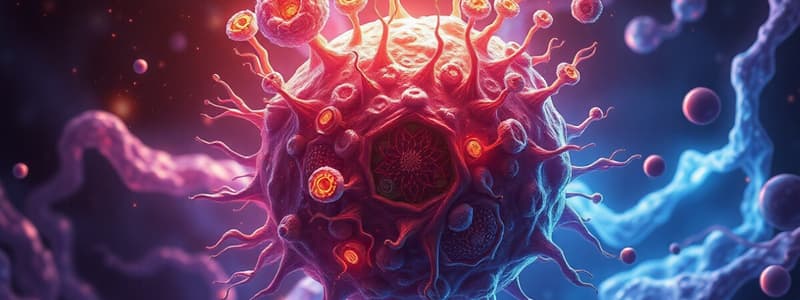Podcast
Questions and Answers
What is the primary function of the gastrointestinal system?
What is the primary function of the gastrointestinal system?
- Production of hormones
- Breakdown and absorption of nutrients (correct)
- Regulation of body temperature
- Immunological defense
Which organ is NOT a part of the urinary/renal system?
Which organ is NOT a part of the urinary/renal system?
- Ureters
- Bladder
- Kidneys
- Liver (correct)
What is one function of the reproductive system?
What is one function of the reproductive system?
- Continuity of genetic information (correct)
- Excretion of waste
- Fluid balance
- Absorption of nutrients
Which pair of organs is involved in the female reproductive system?
Which pair of organs is involved in the female reproductive system?
Which of the following systems is primarily responsible for acid-base balance?
Which of the following systems is primarily responsible for acid-base balance?
What organ is involved in eliminating waste from the body?
What organ is involved in eliminating waste from the body?
Which component is part of the male reproductive system?
Which component is part of the male reproductive system?
Which of the following is a function of the gastrointestinal system?
Which of the following is a function of the gastrointestinal system?
What is the primary function of the skeletal system?
What is the primary function of the skeletal system?
What is primarily regulated by the urinary/renal system?
What is primarily regulated by the urinary/renal system?
Which structure is part of the gastrointestinal tract?
Which structure is part of the gastrointestinal tract?
Which systems are primarily involved in communication, control, and integration of body functions?
Which systems are primarily involved in communication, control, and integration of body functions?
What organ system is primarily responsible for gas exchange?
What organ system is primarily responsible for gas exchange?
Which of the following systems is NOT part of the neuroendocrine system?
Which of the following systems is NOT part of the neuroendocrine system?
What is the primary function of the cardiovascular system?
What is the primary function of the cardiovascular system?
Which body system is primarily responsible for gas exchange?
Which body system is primarily responsible for gas exchange?
What is the main role of the lymphatic system?
What is the main role of the lymphatic system?
Which organ is NOT part of the cardiovascular system?
Which organ is NOT part of the cardiovascular system?
What role does the neuroendocrine system play in homeostasis?
What role does the neuroendocrine system play in homeostasis?
Which system is involved in the elimination of waste products from the body?
Which system is involved in the elimination of waste products from the body?
What is the primary function of the integumentary system?
What is the primary function of the integumentary system?
Which of these structures is associated with the genitourinary system?
Which of these structures is associated with the genitourinary system?
What type of cells are responsible for muscle contraction?
What type of cells are responsible for muscle contraction?
How do the cardiovascular and respiratory systems work together?
How do the cardiovascular and respiratory systems work together?
Which system is involved in the exchange and transport of materials throughout the body?
Which system is involved in the exchange and transport of materials throughout the body?
What is the main function of the gastrointestinal (GI) system?
What is the main function of the gastrointestinal (GI) system?
What is one of the primary functions of the muscular system?
What is one of the primary functions of the muscular system?
Which of the following is NOT a physiological body system mentioned?
Which of the following is NOT a physiological body system mentioned?
What is the role of connective tissue within the musculoskeletal system?
What is the role of connective tissue within the musculoskeletal system?
Which statement best describes homeostasis?
Which statement best describes homeostasis?
Flashcards are hidden until you start studying
Study Notes
Levels of Organisation
- Living organisms are organised on multiple levels, from simplest to most complex: cells, tissues, organs, organ systems, and organisms.
Homeostasis - Model
- Homeostasis is the maintenance of a stable internal environment, essential for proper functioning.
- The body uses feedback loops to regulate internal conditions.
Homeostasis - Classic Example
- Blood glucose levels are controlled through a negative feedback loop, involving insulin and glucagon.
- When blood glucose rises, insulin is released to lower glucose levels; when levels fall, glucagon is released to raise them, maintaining equilibrium.
The Cell
- The cell is the basic structural and functional unit of life.
- Various cell types perform specialised functions in the body.
Cell Membrane
- The cell membrane acts as a barrier and selectively regulates what enters and exits the cell.
- It is composed of a phospholipid bilayer with embedded proteins.
Cell Membrane - Transport
- Substances move across the cell membrane through various mechanisms, including passive diffusion (no energy required) and active transport (requires energy).
Cardiovascular System
- The cardiovascular system is responsible for transporting blood throughout the body.
- It includes the heart, blood vessels (arteries, veins, capillaries), and blood.
Respiratory System
- The respiratory system facilitates gas exchange, taking in oxygen and expelling carbon dioxide.
- It includes the lungs, bronchi, trachea, larynx, and nasal cavity.
Gastrointestinal (GI) System
- The GI system processes food, breaks it down, and absorbs nutrients for the body.
- It includes the stomach, small intestine, large intestine, oesophagus, liver, mouth, and pancreas.
Musculoskeletal (MSK) System
- The MSK system provides support, movement, and protection to the body.
- It includes bones, muscles, tendons, ligaments, and cartilage.
Bone
- Bone is a specialised connective tissue that provides structural support, stores minerals, and produces blood cells.
Neuroendocrine (NEU) System
- The nervous and endocrine systems work together to control and regulate other systems.
- The nervous system uses electrical impulses, while the endocrine system uses hormones to communicate.
Genitourinary (GU)
- The urinary system filters waste products from the blood and produces urine.
- The reproductive system is responsible for sexual reproduction, with male and female organs.
- The GU system includes kidneys, ureters, bladder, urethra, testes, vas deferens, prostate, seminal vesicles, penis, ovaries, fallopian tubes, uterus, vagina, and breast.
Studying That Suits You
Use AI to generate personalized quizzes and flashcards to suit your learning preferences.



